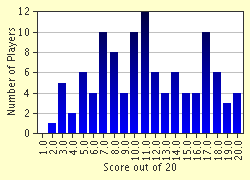Quiz Answer Key and Fun Facts
1. 'She only said,'My life is dreary, He cometh not', she said; She said,'I am aweary, aweary, I would that I were dead', are lines of reported speech that are repeated at the end of each stanza in a classic poem by Alfred, Lord Tennyson. In which poem?
2. In Robert Browning's 'Porphyria's Lover', a dramatic monologue, the nameless speaker kills his beloved Porphyria. How does he do that?
3. Mary Ann Evans (or Marian Evans) wrote 'The Life of Jesus', a translation of 'Das Leben Jesu' by David Friedrich Strauss, one of the leading figures of the 'Higher Criticism' in Germany. Marian also wrote novels, but they were published under a pseudonym. A couple of titles: 'The Mill on the Floss', 'Middlemarch' and 'Silas Marner'. Under what pseudonym is Marian Evans better known?
4. Dante Gabriel Rossetti, John Everett Millais and William Holman Hunt are names that are strongly associated with a certain 19th century artistic movement. How is this movement called?
5. This man lived from 1844 till 1889, but his poems were first published in 1918. He entered the Roman Catholic Church in 1866 and became a Jesuit priest. Among his poems we find 'God's Grandeur' and 'As Kingfishers Catch Fire'. Who is this man?
6. In which town was Oscar Wilde born?
7. I was born in Scotland in 1795. My father was a stonemason who later became a farmer, my mother was illiterate. Although I was born in the same year as Keats, I am considered to be a Victorian, not a romantic. Elizabeth Barrett called me 'the great teacher of the age'. My most famous work is 'Sartor Resartus', first published in Fraser's Magazine in 1833. It's a combination of novel, autobiography and essay. The hero is Professor Diogenes Teufelsdrockh of Germany. I died in 1881. Who am I?
8. 'The Rubaiyat of Omar Khayyam' was a translation of numerous rhymed quatrains from the twelfth century. Who did this translation in 1857?
9. Which famous poem opens with these lines: 'The sea is calm tonight. The tide is full, the moon lies fair Upon the straits - on the French coast the light Gleams and is gone: the cliffs of England stand, Glimmering and vast, out in the tranquil bay'?
10. 'Hymn to Proserpine', 'The Garden of Proserpine' and ' Ave Atque Vale' are works of which poet? He lived from 1837 till 1909.
11. In Oscar Wilde's 'The Importance of Being Earnest', which character says the last line of the play:'On the contrary, Aunt Augusta, I've now realised for the first time in my life the vital Importance of Being Earnest'?
12. Alfred, Lord Tennyson wrote his masterpiece 'In Memoriam' to memorise the death of whom?
13. I'm looking for one of the greatest novelists of the 19th century, although I guess he's not that well-known anymore in this day and age. Some of his work:'The Ordeal of Richard Feverell' (1859), 'The Egoist' (1879), and 'Modern Love' (a collection of poems from 1862). He married the daughter of the satirist Thomas Love Peacock. So, who am I looking for?
14. One of the most dramatic controversies in the Victorian age concerned theories of evolution. This controversy exploded into prominence in 1859 when Charles Darwin's 'Origin of Species' was published. An important event in the debate was the famous Oxford Meeting of 1860. Defender of Darwinism that day was Thomas Henry Huxley. His main opponent was a bishop who asked him:'Is it through your grandfather or your grandmother that you claim to descent from a monkey?' What is the name of this bishop?
15. Can you fill in the missing word in this title of a famous poem by Robert Browning. 'Caliban upon ... (or Natural Theology in the Island)'?
16. Despite its later reputation as an age of solemnity, the Victorian age produced a remarkable outburst of humorous prose and verse. One typically Victorian speciality of humorous verse is to be found in the works of Edward Lear and Lewis Carroll. How is this style of writing known?
17. Patrick and Maria Bronte had six children. Within a year, the two elder girls had died. The remaining siblings grew up in a very literary family. One of them was a boy: Branwell. The oldest sister was Charlotte, the youngest one Anne. What is the name of the 5th child, maybe the most famous?
18. Short and easy: Who wrote 'Aurora Leigh' (first and last name)?
19. The six most important Victorian poets (according to the so-called 'Major Authors' edition of the 'Norton Anthology' (6th edition)), are Alfred, Lord Tennyson, Elizabeth Barrett Browning, Robert Browning, Matthew Arnold, Gerard Manley Hopkins and .... Well, who is the 6th (both first and last name)?
20. The title of this quiz was taken from the book 'Eminent Victorians', published in 1918 by an early modernist who didn't like Victorians at all. In this book 4 portraits are presented of 4 well-known Victorians, each representing a certain part of society. The author of the book declares these figures to be 'characteristic specimens' of the age. His main goal is to make them look ridiculous, thereby attacking the whole Victorian culture and art and at the same time defending modern society. Who is the author of 'Eminent Victorians'?
Source: Author
marienbart
This quiz was reviewed by FunTrivia editor
agony before going online.
Any errors found in FunTrivia content are routinely corrected through our feedback system.


